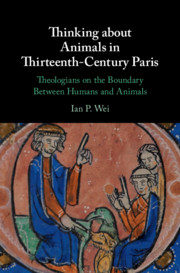 Thinking about Animals in Thirteenth-Century Paris
Thinking about Animals in Thirteenth-Century Paris Published online by Cambridge University Press: 07 August 2020
When Parisian theologians of the thirteenth century wrote about animals and the similarities and differences between animals and humans, there was great variety and richness in their work. While ‘the paradigm of the boundary’ persisted, ‘the plurality and density of medieval thought about animals’ that Susan Crane so brilliantly identified in vernacular literature was equally characteristic of theological texts written in Latin.1 With reference to bestiaries, Crane observed that ‘With ratio as their distinguishing feature, humans are crucially differentiated from other animals; with ratio even slightly shared out among them, animal difference is shot through with similitude’, and it is clear that for the masters ‘animal difference’ was indeed ‘shot through with similitude’.2 Moreover, while historians of philosophy like Anselm Oelze have, with immense precision and eloquence, explained the different ways in which some medieval scholars attributed various ‘rational processes’ to animals, it is also apparent that preoccupation with and desire to explore similarity between animals and humans extended into many different areas of the theologians’ endeavours, including, as we have seen, discussions of creation, the fall, divine providence, the heavens, angels and demons, virtues and passions, to list just some of the topics that prompted theologians to assess continuity between the animal and the human.
To save this book to your Kindle, first ensure no-reply@cambridge.org is added to your Approved Personal Document E-mail List under your Personal Document Settings on the Manage Your Content and Devices page of your Amazon account. Then enter the ‘name’ part of your Kindle email address below. Find out more about saving to your Kindle.
Note you can select to save to either the @free.kindle.com or @kindle.com variations. ‘@free.kindle.com’ emails are free but can only be saved to your device when it is connected to wi-fi. ‘@kindle.com’ emails can be delivered even when you are not connected to wi-fi, but note that service fees apply.
Find out more about the Kindle Personal Document Service.
To save content items to your account, please confirm that you agree to abide by our usage policies. If this is the first time you use this feature, you will be asked to authorise Cambridge Core to connect with your account. Find out more about saving content to Dropbox.
To save content items to your account, please confirm that you agree to abide by our usage policies. If this is the first time you use this feature, you will be asked to authorise Cambridge Core to connect with your account. Find out more about saving content to Google Drive.